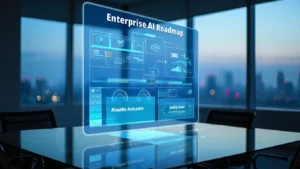- AI Delivers Personalization at Scale: AI enables marketers to tailor experiences for individual customers through data analysis, improving engagement and loyalty while saving time and resources.
- Data-Driven Decision-Making: AI tools help marketers predict trends, optimize campaigns, and make informed decisions, leading to better-targeted strategies and improved ROI.
- Maximizing Efficiency with Automation: AI automates repetitive tasks like email marketing and ad optimization, allowing teams to focus on creative strategy and improving campaign performance.
The AI Revolution in Marketing
Artificial Intelligence (AI) has progressed from a buzzword to an essential tool in marketing strategies across industries. By leveraging AI, marketers can automate repetitive tasks, personalize customer experiences, and optimize data-driven decisions.
The technology has made it easier to analyze vast amounts of data and predict customer behaviors, and changed how brands interact with their audiences. AI’s role in marketing has grown exponentially, shifting from just a curiosity to a central player in creating more efficient, engaging, and effective marketing campaigns.
Initially, many brands adopted AI for fear of missing out (FOMO). The hype surrounding AI created a rush to integrate these technologies into marketing strategies without fully understanding how to maximize their potential.
Over time, however, businesses have realized that AI is not just a trendy tool but a measurable driver of return on investment (ROI). Companies that use AI strategically have seen tangible results in customer engagement, lead generation, and revenue growth, moving beyond the initial hype to realize AI’s full potential.
This article will explore how marketers can move from simply following AI trends to leveraging them for measurable ROI. We’ll dive into how AI impacts various marketing functions, the tools available, real-world case studies, and challenges to consider.
Understanding the Impact of AI in Marketing
Marketers can now analyze data deeply, predict consumer behavior, and deliver highly tailored experiences, thanks to AI. The tools available today allow marketers to go beyond one-size-fits-all campaigns, and create personalized strategies that resonate with individual users and drive better results.
Let’s explore how AI is reshaping key areas of marketing.
AI-Driven Personalization
AI allows marketers to personalize experiences at an unprecedented scale. By analyzing customer behavior, preferences, and interactions, AI tools can deliver targeted content, recommendations, and product suggestions that feel highly tailored to individual users. This level of personalization was once time-consuming and resource-intensive but is now achievable in real time, and helps brands establish deeper connections with their audiences.
For instance, Netflix and Amazon use AI-driven algorithms to suggest content or products based on user activity, improving engagement and boosting sales.
AI in Customer Service and Engagement
AI-powered chatbots and virtual assistants have completely changed customer service. These tools can handle inquiries, resolve issues, and even guide customers through purchasing decisions without human intervention.
By providing instant responses 24/7, chatbots enhance customer satisfaction and reduce wait times. Furthermore, AI tools can analyze customer queries to identify patterns and potential improvements in service, leading to more proactive engagement strategies.
Predictive Analytics for Better Marketing Decisions
AI’s predictive analytics capabilities allow marketers to make informed decisions by forecasting trends and behaviors. AI can predict which marketing strategies will resonate most with specific segments, optimizing campaigns for maximum effectiveness by analyzing past data. For example, AI can help marketers identify customers likely to churn and create retention strategies before it’s too late.
AI in Content Creation and Curation
AI has also made content creation more efficient than ever before. Tools like Jasper and Copy.ai assist in generating blog posts, social media updates, and ad copy, while content curation platforms help marketers identify trending topics or relevant articles to share. Although AI cannot fully replace human creativity, it is a powerful tool for streamlining content production and ensuring relevance.
Turning AI Hype into Measurable ROI
Moving beyond the initial excitement surrounding AI, marketers are now focusing on proving its value through clear, measurable outcomes. To make the most of AI investments, it’s essential to establish a strategic approach, focusing on the key areas where AI can deliver tangible ROI.
Setting Clear Goals and KPIs for AI Tools
The first step to achieving ROI with AI is to establish clear goals and key performance indicators (KPIs). Without clear objectives, businesses risk investing in AI technologies without knowing how to measure success. Define what success looks like, whether it’s increased website traffic, higher conversion rates, or improved customer satisfaction. This will help ensure that AI is used strategically and results are accurately tracked.
Maximizing ROI with AI-Powered Automation
AI-driven automation can free up valuable time for marketers by handling tasks like email marketing, social media scheduling, and campaign optimization. For instance, tools like Mailchimp or HubSpot can automate email sequences based on user behavior, while AI-driven platforms can manage A/B testing, helping marketers make data-driven decisions more quickly. Automation helps reduce human error, increase efficiency, and optimize performance, all while focusing resources on more creative tasks that drive innovation.
Optimizing Advertising Spend with AI
One of AI’s most impactful applications in marketing is optimizing ad spend. AI tools like Google Ads’ Smart Bidding use Machine Learning to adjust bidding strategies based on real-time data, improving ad performance while reducing costs.
By analyzing which ads perform best with certain audiences and adjusting targeting strategies accordingly, AI ensures that marketing budgets are used effectively. This level of precision leads to higher click-through rates, better engagement, and ultimately, increased ROI.
Case Study: AI-Driven Campaign Success
An example of AI success in marketing can be seen in Harley-Davidson’s use of AI to boost sales in New York. By utilizing an AI-driven platform, the company was able to analyze customer data, refine its ad targeting, and launch more personalized campaigns. The result? A 40% increase in qualified leads and a 2,930% return on ad spend within three months. This case exemplifies how AI, when used strategically, can lead to significant returns on investment.
Popular AI Tools and Platforms for Marketers
Marketers today have access to AI tools that bring precision and efficiency to nearly every aspect of their campaigns. From managing customer relationships to optimizing email marketing and social media efforts, these platforms are transforming how marketing teams operate. Here are some of the key AI tools making waves in the marketing world.
AI-Powered Customer Relationship Management (CRM)
Customer Relationship Management (CRM) platforms like Salesforce Einstein and HubSpot use AI to enhance customer interactions, manage leads, and track performance. These tools provide predictive analytics, automating processes like lead scoring and follow-up recommendations. With AI-powered CRMs, marketers can anticipate customer needs, automate outreach, and streamline the customer journey from start to finish.
AI in Email Marketing Automation
Platforms such as Mailchimp and ActiveCampaign harness AI to optimize email marketing efforts. By analyzing user behavior, these tools suggest the best times to send emails, segment audiences based on engagement, and personalize content to maximize click-through rates. AI in email marketing improves deliverability, open rates, and overall engagement, turning automated email campaigns into powerful revenue drivers.
AI for Social Media Marketing
AI tools like Sprout Social and Hootsuite have transformed social media marketing by automating scheduling, analyzing performance, and offering insights for improvement. These platforms leverage AI to track audience sentiment, monitor trends, and suggest the best times for posting, ensuring that content reaches the right people at the right time.
AI in SEO and Content Optimization
AI-powered SEO tools like MarketMuse and Clearscope help marketers optimize their content for search engines. These platforms analyze keyword intent, suggest related topics, and offer recommendations for improving content relevance, helping marketers achieve higher rankings and increased organic traffic.
Challenges and Ethical Considerations of AI in Marketing
While AI offers numerous advantages for marketers, it also comes with its own set of challenges, particularly when it comes to ethics and responsible use. As AI becomes more integrated into marketing strategies, businesses need to address these concerns to ensure they are using AI in a way that is both effective and ethical. Let’s delve into some of the key challenges and considerations.
Data Privacy and Security Concerns
AI relies heavily on consumer data, raising concerns about privacy and security. As marketers collect and analyze vast amounts of information, it’s critical to comply with regulations like GDPR and CCPA to protect customer data. Businesses must ensure transparency about how data is used and implement robust security measures to safeguard sensitive information.
Avoiding Over-Automation and Maintaining Human Touch
While AI can handle many tasks, over-automation can lead to impersonal and robotic customer experiences. It’s crucial to strike a balance between automation and maintaining the human touch. AI should enhance marketing efforts, not replace the empathy, creativity, and relationship-building that humans bring to the table.
AI Bias in Marketing Algorithms
AI algorithms are not immune to bias. When algorithms are trained on biased data, they can perpetuate stereotypes or favor certain groups over others, especially in ad targeting and segmentation. Marketers must regularly audit AI systems to ensure they operate fairly and inclusively.
Ensuring Transparency in AI-Driven Marketing
To build trust with customers, businesses must be transparent about how AI is used in marketing. Customers should know when they are interacting with AI, and how their data is being collected and processed. Transparency fosters trust, making customers feel more comfortable engaging with AI-driven marketing.
The Future of AI in Marketing
AI’s role in marketing is only beginning to reveal its full potential. It’s shaping a new landscape where brands can connect with their audiences in more intelligent, tailored ways.
Emerging AI Trends in Marketing
Hyper-personalization, driven by real-time behavioral analysis, is set to become the norm, and will allow marketers to tailor content more precisely than ever before. Moreover, the integration of AI with augmented reality (AR) and virtual reality (VR) will change how brands engage with customers, and offer immersive experiences that might blur the lines between physical and digital.
The Evolution of AI and Human Collaboration
AI is not here to replace human marketers but to work alongside them. The future of marketing lies in the seamless collaboration between AI and human creativity. AI can handle the heavy lifting of data analysis and task automation, leaving marketers free to focus on strategy, creativity, and building meaningful connections with their audiences.
Long-Term Benefits of AI in Marketing
The long-term benefits of AI in marketing are clear. As AI technologies continue to advance, they will drive greater efficiency, accuracy, and customer satisfaction. Businesses that invest in AI now are setting themselves up for long-term success by future-proofing their marketing strategies and unlocking new opportunities for growth.
Further Reading
For those interested in diving deeper into AI’s role in marketing, here are some recommended resources:
- Books: AI for Marketing and Product Innovation by A.K. Pradeep and Marketing Artificial Intelligence by Paul Roetzer offer comprehensive insights into how AI is transforming marketing.
- Research Reports: Gartner and Forrester have published industry reports detailing how AI is shaping marketing and generating ROI.
- Online Courses: Google, Coursera, and LinkedIn Learning offer courses on AI tools and strategies that can help marketers master AI-driven marketing approaches.
FAQs: AI in Marketing
Q1: How can AI improve my marketing ROI?
AI optimizes marketing strategies by automating tasks, enhancing personalization, improving ad targeting, and providing data-driven insights, all of which lead to better results and increased ROI.
Q2: What are the best AI tools for marketing automation?
Some popular AI tools for marketing automation include Mailchimp, HubSpot, Salesforce Einstein, and Sprout Social, all of which streamline tasks and improve campaign performance.
Q3: Is AI in marketing suitable for small businesses?
Yes, AI-powered tools are scalable and accessible to businesses of all sizes. Small businesses can use AI to improve customer engagement, streamline marketing efforts, and achieve better results.
Q4: What are the main challenges of using AI in marketing?
Challenges include managing data privacy, preventing AI bias in decision-making, ensuring transparency in AI usage, and maintaining a balance between automation and human touch.
Q5: How can I measure the ROI of my AI-powered marketing campaigns?
To measure ROI, set clear goals and KPIs before using AI tools. Track metrics like conversion rates, customer engagement, and cost-per-acquisition, and regularly analyze campaign performance to ensure continuous optimization.
Final thoughts: Moving from FOMO to ROI with AI in Marketing
AI has moved beyond the hype, delivering measurable ROI for marketers who know how to harness its power effectively. By setting clear goals, using the right tools, and balancing automation with human creativity, businesses can turn AI from a source of FOMO into a key driver of success.
As AI continues to evolve, it will play an increasingly important role in shaping the future of marketing. By improving efficiency, driving personalization, and empowering marketers to make data-driven decisions, AI will revolutionize the way brands engage with customers and achieve long-term success.
If you’re ready to take your business to the next level with advanced AI technology solutions, contact RTS Labs today for a free consultation. Our experts are here to help you leverage the power of AI to boost your business success.









